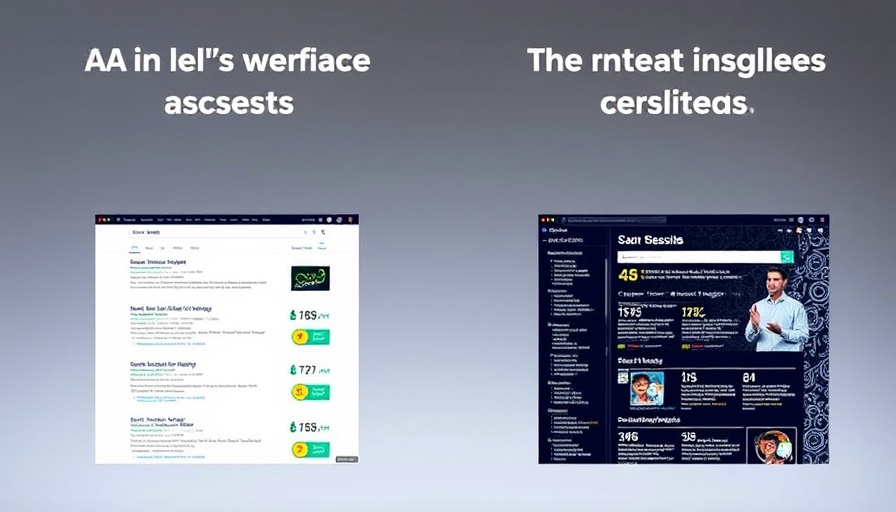
The Evolution of SEO: From Traditional to AI-Driven
As the world of search engine optimization (SEO) continues to evolve, staying ahead means adapting to not just good practices, but also to emerging trends. The conversation has shifted toward AI-driven search optimization, an area often referred to as AI search optimization (AEO). This article delves into the nuances of traditional SEO compared to AI-driven practices, revealing insights that can significantly enhance visibility in a crowded digital landscape.
In 'The Truth About AI SEO,' the discussion dives into how evolving SEO roles impact brand visibility. This inspired our deeper analysis.
Understanding the Gap Between SEO and AI Search Optimization
Traditional SEO practices have been the cornerstone of digital marketing for years. However, the emergence of AI technologies, such as language models (LLMs), necessitates a broader strategy. As highlighted by Nathan Gotch, merely ranking well on search engines does not inherently translate to visibility within AI-generated responses. The modern marketer must recognize that different platforms harbor distinct algorithms that determine brand visibility.
Why Traditional SEO Isn't Enough: Real-Life Case Studies
Real-world examples illustrate the disparities between brands that excel in traditional SEO and those that falter in AI-driven contexts. Brands like Chesterfield Service thrive in traditional search, showing robust presence across Google and Bing, yet struggle to gain traction in AI systems. Conversely, some brands perform well on AI platforms despite a minimal traditional presence, underscoring the inconsistencies that warrant further exploration.
Bridging the Visibility Gap: Opportunities for Brands
For businesses aiming to optimize their visibility across various platforms, it’s crucial to identify and fill the gaps where their brands fall short. Nathan Gotch suggests reviewing citation performance across multiple search engines and LLMs, highlighting AI’s focus on first-party vs. third-party citations. First-party citations are those emanating directly from the business, while third-party citations include directory listings not controlled by the brand. The numbers are staggering: 43% of citations in LLMs come from first-party sources, revealing a significant area for brands to exploit.
Effective Strategies for Enhancing Brand Visibility
To maximize performance across both traditional and AI search engines, it's essential for brands to optimize their presence in popular directories. Websites like Yelp and Angie’s List emerge as critical platforms where citations frequently appear in LLM results. Professional marketers should prioritize enhancing their profiles on these sites to drive visibility. Meanwhile, supporting traditional commercial pages with localized, original content will help solidify a brand's authority in its specific niche.
The Role of Content in Bridging AI Search Gaps
Creating high-quality, relevant content is critical in enhancing both SEO and AI-driven visibility. Nathan Gotch emphasizes the importance of developing comprehensive localized commercial pages that align with customer intent. By focusing on user-centric content that contains valuable statistics and unique insights, businesses can increase their chances of being cited within AI-generated results. This also means utilizing tools like the Rankability software to identify existing content and potential new topics that align with user search behavior.
Future Trends: Preparing for the Next SEO Revolution
The landscape of search engine optimization is continually shifting. Predictions indicate that AI technologies will play a more prominent role in determining search outcomes. Brands that understand and adapt to these changes early on will not only survive but thrive in the future. As Nathan Gotch aptly puts it, effective marketing in the near future will hinge on a brand's presence across diverse platforms, as well as its ability to produce valuable content efficiently.
Conclusion: Take Action for Optimal Engagement
Today’s digital environment requires a comprehensive approach to SEO tailored for both traditional search engines and emerging AI methods. To prepare for the future, marketers should assess their current strategies and identify areas of improvement—be it through enhanced presence on platforms, improved content quality, or filling gaps in citations. It’s time to embrace a broader vision of SEO, elevating your brand’s visibility across all platforms effectively.
 Add Row
Add Row  Add
Add 




Write A Comment